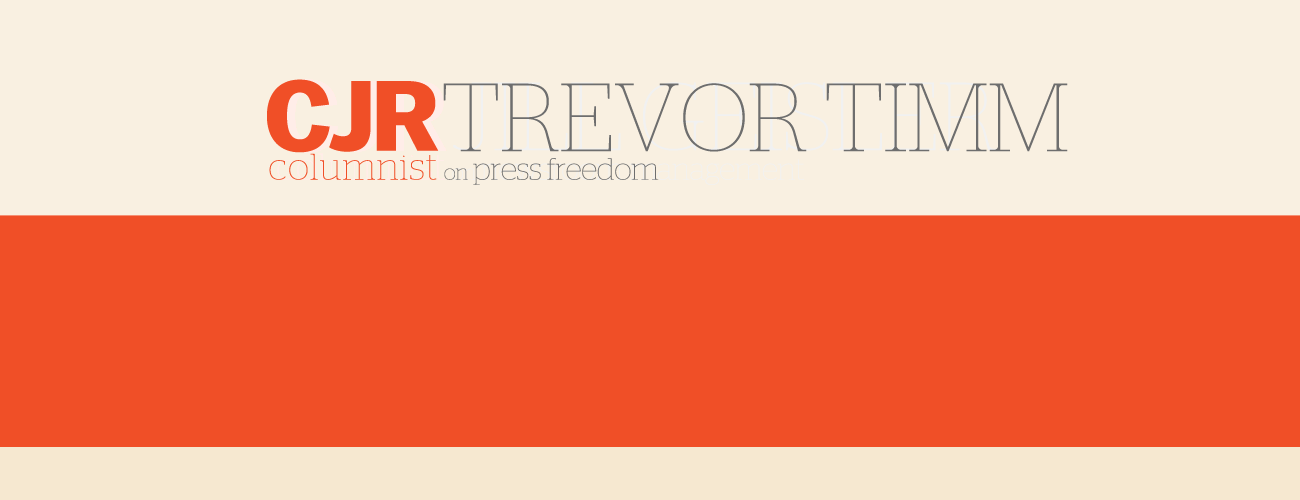Sign up for The Media Today, CJR’s daily newsletter.
During an interview with Fox News on Sunday, President Obama–perhaps inadvertently–exposed the US classification system for what it really is: completely arbitrary and utterly broken. In the process, he described the hypocritical nature of his administration’s approach to secrecy.
“There’s classified, and then there’s classified,” the president told Fox News anchor Chris Wallace in response to a question about the now-classified material on Hillary Clinton’s private email server from when she was Secretary of State. Obama continued: “There’s stuff that is really top-secret Top Secret, and there’s stuff that is being presented to the president or the secretary of state that you might not want on the transom, or going out over the wire, but is basically stuff that you could get in open-source.”
So in other words, sometimes “Top-Secret intelligence” is information “which reasonably could be expected to cause exceptionally grave damage to the national security,” as the executive order detailing the classification system describes. And other times, it’s innocuous information you can potentially find on Google.
Of course, any system that classifies information is going to be somewhat subjective. But the exceptionally wide gulf between actual secrets and using a classified stamp to hide anything that might be politically sensitive has been a hallmark of the US secrecy state for years–and it makes it a nightmare for any journalist covering national security issues to learn what the government is actually doing.
The fact that the US secrecy system is manipulated and abused by those in power isn’t an “open secret” in Washington, it’s an established fact–and has been for decades.
Examples abound of some agencies classifying things others don’t, or of public documents getting censored in one place and publicly released in another. As The New York Times pointed out on Monday, journalists reporting on the leaked WikiLeaks State Department cables in 2010 regularly came across already-public news articles that were stamped with the “secret” emblem–just as Times reporters were shocked to find their previous articles classified when they first went through the Pentagon Papers over 40 years ago.
But don’t just take journalists’ word for it: Since the Eisenhower administration devised the modern classification system, countless former government officials have been willing to explain how the classification system is fundamentally broken.
Some officials, like the former classification czar under George W. Bush, J. William Leonard, make it their mission to inform the public of this after they’ve left office. Others, like former NSA and CIA director Michael Hayden, who makes his living off the secrets he still holds, regularly complains about overclassification, once saying: “Everything’s secret. I mean, I got an email saying, ‘Merry Christmas.’ It carried a Top Secret NSA classification marking.”
Just this weekend, a group of former senators were on 60 Minutes protesting the fact that the government has inexplicably kept the notorious 28 pages of the 9/11 Commission report that allegedly detail Saudi Arabia connections to the attacks secret for almost a decade and a half.
But it is rare that you will hear a sitting president confess so plainly that intelligence agencies regularly disregard the law that lays out what should be secret and what should not.
What makes Obama’s statement so infuriating rather than refreshing is that advocacy groups and news organizations often make the exact argument in court that Obama made on television–that material considered “classified” is actually not that secret at all. Yet time and again they’re met by intringent resistance from the Obama administration’s Justice Department. The DOJ has convinced judges to rarely, if ever, even entertain the notion that the government has improperly classified something–even when it’s obvious. And the agency is actively fighting FOIA reform legislation that would give judges more latitude to do just that.
The record number of sources and whistleblowers who have been prosecuted under the Espionage Act during the Obama administration have also tried unsuccessfully to make the argument that what they revealed to journalists should have never been classified or wasn’t a secret at all. The Justice Department has continually convinced judges this information should be inadmissible and juries should never hear it; lives of whistleblowers have been ruined and sources of reporters languish in jail because of the Justice Department’s position.
As secrecy expert Steven Aftergood put it this week: Obama “failed to grapple with the fact that a bunch of people in his administration have been caught up in a meat-grinder as a result of classification policy.”
These prosecuted sources and whistleblowers were almost all low-level government employees, of course, not powerful secretaries of state and leading candidates for the White House. So they obviously were not able to call the president to the stand to speak on their behalf.
But who knows, now maybe that’ll start to change. As independent journalist Marcy Wheeler of the popular Emptywheel blog remarked upon hearing the President’s candor on Sunday: “May this be cited in 1,000 Espionage prosecutions and [Freedom of Information Act] lawsuits.”
Trevor Timm is the executive director of Freedom of the Press Foundation, a non-profit organization that supports and defends journalism dedicated to transparency and accountability. He is also a twice-weekly columnist for the Guardian, where he writes about privacy, national security, and the media.

